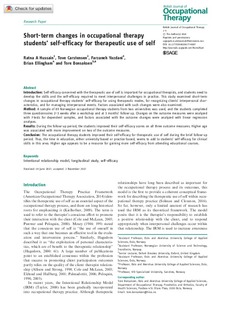Short-term changes in occupational therapy students’ self-efficacy for therapeutic use of self
Journal article, Peer reviewed
Published version
Permanent lenke
http://hdl.handle.net/11250/2480639Utgivelsesdato
2018Metadata
Vis full innførselSamlinger
Originalversjon
10.1177/0308022617745007Sammendrag
Introduction
Self-efficacy concerned with the therapeutic use of self is important for occupational therapists, and students need to develop the skills and the self-efficacy required to meet interpersonal challenges in practice. This study examined short-term changes in occupational therapy students’ self-efficacy for using therapeutic modes, for recognizing clients’ interpersonal characteristics, and for managing interpersonal events. Factors associated with such changes were also examined.
Method
A sample of 89 Norwegian occupational therapy students from two universities was used, and the students completed three questionnaires 2–3 weeks after a workshop and at 3 months’ follow-up. Changes on the outcome measures were analyzed with t-tests for dependent samples, and factors associated with the outcome changes were analyzed with linear regression analyses.
Results
During the follow-up period, the students improved their self-efficacy scores on all three outcome measures. Higher age was associated with more improvement on two of the outcome measures.
Conclusion
The occupational therapy students improved their self-efficacy for therapeutic use of self during the brief follow-up period. Thus, the time in education, either university-based or practice-based, seems to add to students’ self-efficacy for clinical skills in this area. Higher age appears to be a resource for gaining more self-efficacy from attending educational courses.
